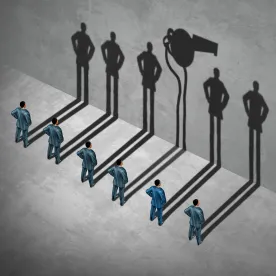In David Grant v. United Airlines Inc., a False Claims Act (FCA) retaliation case brought by a United Aviation Maintenance Technician, the Fourth Circuit clarified the broad scope of protected whistleblowing under the FCA’s anti-retaliation provision.
David Grant’s Whistleblowing
In the course of providing engine maintenance services for the Air Force’s fleet of Boeing C-17s, Grant discovered that United was certifying repairs that did not meet federal aviation regulations and Air Force Technical Orders. He raised concerns about United “pencil whipping” repairs, i.e., certifying that work had been completed even when it had not, and certifying repairs that had been performed using uncalibrated and uncertified tools. For example, United certified that it was conducting fluorescent penetrant inspections for cracks in engine parts using a calibrated radiometer when in fact it was performing those inspections using an uncalibrated radiometer or without a radiometer at all. Grant’s disclosures culminated in him warning a managing director in writing that United’s maintenance practices could “result in catastrophic failure to an engine.” The following day, United terminated Grant’s employment.
False Claims Act Protected Whistleblowing
The district court dismissed Grant’s FCA retaliation claim on the basis that Grant “fail[ed] to allege that he conducted any investigation or took any steps in furtherance of commencing a FCA action before his termination.” The Fourth Circuit reversed, holding that the 2010 amendments to the FCA broadened the scope of protected conduct. Under the amended FCA whistleblower protection provision, a whistleblower need not meet the “distinct possibility” standard, i.e.,there is no requirement to show that FCA litigation is a distinct possibility or that an FCA action is in the offing. The 2010 amendments to the FCA added a new form of protected conduct — “other efforts to stop 1 or more violations of [the FCA].” This form of protected FCA whistleblowing encompasses more than just activities undertaken in furtherance of a FCA qui tam lawsuit.
Applying the broader scope of FCA protected conduct, the court found that Grant engaged in protected activity when he tried to stop at least one violation of the FCA. Grant alleged in his complaint that he complained on multiple occasions about United’s pencil whipping and failure to use proper tools, complaints alleging specific illegal, fraudulent conduct against the government. And his belief that United might be defrauding the government was objectively reasonable because he observed United coercing investigators to falsify engine repairs and coercing an inspector not to document problematic engines. In sum, a trier of fact could find that he engaged in “efforts to stop” a potential FCA violation.
Close Temporal Proximity Suffices to Prove Causation
The Fourth Circuit also held that Grant sufficiently pled that United retaliated against him as a result of his protected conduct by alleging that United terminated his employment shortly after he blew the whistle. In March 2014, Grant raised concerns to United managers about “pencil whipping” and other potentially fraudulent conduct. Within a month of Grant raising his concerns, he was escorted out of the building when he was observed taking pictures in furtherance of his complaints. Soon after, he wrote an email to the Managing Director of Maintenance warning of potential catastrophic engine failure. United fired him the next day. The Fourth Circuit held that Retaliation following close on the heels of protected conduct can establish the retaliation resulted from the protected whistleblowing.
Implications for Whistleblowers
The Fourth Circuit’s decision in Grant clarifying that a FCA retaliation plaintiff need not meet the “distinct possibility” standard underscores the broad scope of protected conduct under the FCA. In addition, it suggests that “but-for” causation is not that onerous in that close temporal proximity can establish causation.



 />i
/>i
